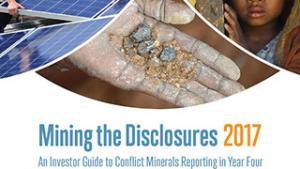 ‘Mining the Disclosures 2017’ published recently by the Responsible Sourcing Network (RSN) has highlighted a ‘troubling trend’ in downstream corporate conflict minerals reporting towards more ‘tick-box’ compliance testing and away from stronger ‘risk-based’ due diligence approaches to use of 3T minerals in their products.
‘Mining the Disclosures 2017’ published recently by the Responsible Sourcing Network (RSN) has highlighted a ‘troubling trend’ in downstream corporate conflict minerals reporting towards more ‘tick-box’ compliance testing and away from stronger ‘risk-based’ due diligence approaches to use of 3T minerals in their products.
Based on these results RSN calls on investors to adopt more comprehensive, proactive policies and strengthen support for existing multi-stakeholder initiatives, including on-the-ground efforts to source from legitimate mines. The report lists the ITSCI programme as one of several in-region sourcing or development initiatives.
This fourth such report scores US Securities and Exchange Commission (SEC) filing data for a sample of 206 companies using 21 Key Performance Indicators (KPI). In 2017, 85% of the sample group scored as Adequate, Minimal or Weak compared to only 64% in 2016. The ability of companies to identify an existing risk inside their supply chains dropped by over a third, and less companies were verifying suppliers responses.
The authors mainly attribute this declining momentum to ‘unhelpful uncertainty’ over future of the conflict minerals clause 1502 in the Dodd-Frank Act, although the top five leading companies – Intel, Microsoft, Qualcomm, Apple & Royal Philips – continue to implement proactive, due-diligence-based strategies.
The report notes “efforts led by the tin industry’s iTSCi program with significant results in the production and exports from certified “conflict-free” mines, especially regarding cassiterite (tin ore)”. Also noted was an improvement in adoption of conflict minerals policies and response strategies by smelters and refiners.
Any downstream company wanting to respond by engaging more closely with risks at 3T mines can join ITSCI to contribute to the work in a positive way and receive all information they may require.
